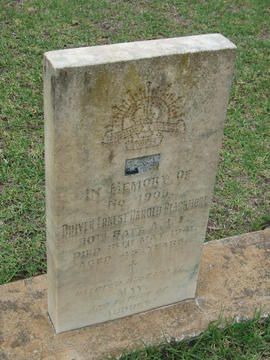
55654
BLACKMORE, Ernest Harold
| Service Number: | 1905 |
|---|---|
| Enlisted: | Not yet discovered |
| Last Rank: | Private |
| Last Unit: | 10th Infantry Battalion |
| Born: | Adelaide, 1895 |
| Home Town: | Not yet discovered |
| Schooling: | Not yet discovered |
| Occupation: | Cook |
| Died: | May 1941, cause of death not yet discovered, place of death not yet discovered |
| Cemetery: | Not yet discovered |
| Memorials: |
World War 1 Service
| 20 Apr 1915: | Involvement Private, 1905, 10th Infantry Battalion, --- :embarkation_roll: roll_number: '10' embarkation_place: Adelaide embarkation_ship: HMAT Hororata embarkation_ship_number: A20 public_note: '' | |
|---|---|---|
| 20 Apr 1915: | Embarked Private, 1905, 10th Infantry Battalion, HMAT Hororata, Adelaide | |
| 11 Nov 1918: | Involvement 1905 |
Help us honour Ernest Harold Blackmore's service by contributing information, stories, and images so that they can be preserved for future generations.
Add my storyBiography contributed by St Ignatius' College
On the 4th of February 1915, Ernest Harold Blackmore enlisted to join the first world war effort. He was born in Adelaide in South Australia in 1895 date unknown. Little is known about his life before the war, but his profession was listed as a cook. His next of kin was his mother, Francis Blackmore of Coburg Road, Alberton, South Australia. Ernest was a Methodist.
His unit was listed as the 10th Battalion. He departed Adelaide to England on the ship the Hororata on the 20th of April 1915 to England for a period of training.
When he arrived in England, he was at a training camp located at Parkhouse near Tidworth. During his training, Ernest was transferred to a training depot at the Parkhouse working with the 2nd Field Butchery on the 19/9/16.
On the 28/5/17 he committed a crime of insolence to the regimental police. As a result of this he was deprived of 7 days’ pay. On the day he committed his crime the 10th Battalion unit diary shows they were on training leave in Amiens at the time and it may have occurred off duty. He was ranked a Private for 3 years before becoming a Driver in December 1917. He was mainly a cook/butcher during the early years of the war. Ernest made and supplied food to soldiers in the trenches on the western front. Food preparation would have been an important role in the trenches. All the cooks and butchers would have to prepare meals for thousands of soldiers. The conditions in which they had to prepare food would have been poor and it would have taken some effort to keep the food clean and safe for the soldiers to eat. Cooks and butchers played a vital role in the war; without cooks and butchers the soldiers would have no food in the trenches. Food often eaten in the trenches include canned beef, horse meat, pea soup, biscuits and bread.
He returned safely home to Australia on the 5th April 1919. He was then discharged from the army on the 15th of July 1919 and he died in May 1941 at the age of 45.









